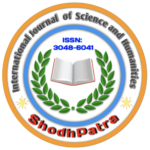| Article Title |
Communicating Climate Knowledge: A Media-Centric SWOT Analysis of the National Mission on Strategic Knowledge for Climate Change |
| Author(s) | Shubham Kumar Sah, Virendra Kumar, Prof. Atish Prashar. |
| Country | India |
| Abstract |
Climate change is one of the most critical challenges facing India, requiring not only scientific research but also effective communication to ensure public understanding and policy support. The National Mission on Strategic Knowledge for Climate Change (NMSKCC), a component of India’s National Action Plan on Climate Change (NAPCC), aims to strengthen the country’s knowledge systems to support climate-related decision-making. This study presents a media-centric SWOT (Strengths, Weaknesses, Opportunities, and Threats) analysis of the NMSKCC, focusing on how climate knowledge is communicated and disseminated through various media channels. By examining official mission documents, related academic literature, and media reports, the paper evaluates the mission’s performance in raising awareness, promoting engagement, and influencing climate discourse in India. The analysis reveals key strengths such as institutional support and knowledge generation, but also highlights weaknesses including limited public outreach and inadequate media integration. Opportunities exist to enhance strategic communication, especially through digital platforms and public service media, while threats include misinformation, low media literacy, and fragmented communication efforts. The study concludes with suggestions for improving the mission’s visibility and impact by aligning its objectives with more inclusive, transparent, and media-friendly communication strategies. |
| Area | Journalism and Mass Communication |
| Issue | Volume 2, Issue 6, June 2025 |
| Published | 21-06-2025 |
| How to Cite | Sah, S. K., Kumar, V., & Prashar, A. (2025). Communicating Climate Knowledge: A Media-Centric SWOT Analysis of the National Mission on Strategic Knowledge for Climate Change. ShodhPatra: International Journal of Science and Humanities, 2(6), 93-104, DOI: https://doi.org/10.70558/SPIJSH.2025.v2.i6.45213. |
| DOI | 10.70558/SPIJSH.2025.v2.i6.45213 |
ShodhPatra: International Journal of Science and Humanities

 View / Download PDF File
View / Download PDF File